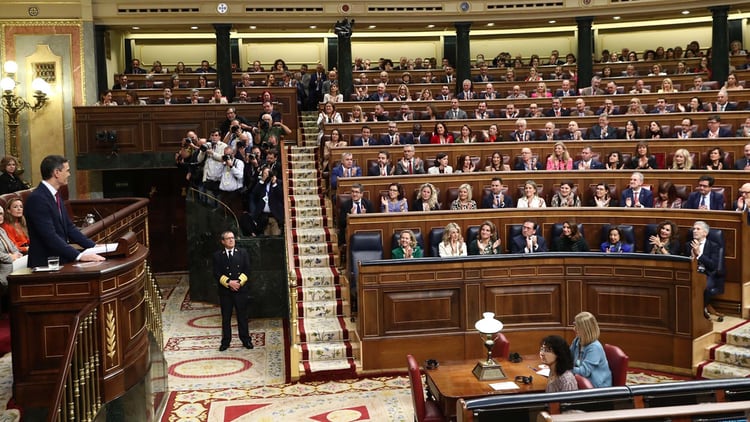Luis Ayllón
Pedro Sánchez announced yesterday during his investiture debate to be re-elected President of the Government that he is committed to working in Europe for the recognition of the Palestinian State.
The commitment was made at the beginning of his speech, after referring to the situation in Gaza. Sánchez called for an “immediate ceasefire by Israel” on the Strip, as well as “strict compliance with international humanitarian law” in the operation that Israel has been carrying out since the Hamas attack on 7 October.
Sánchez considers that in the operation being carried out by Israel, International Humanitarian Law “is clearly not being respected”. The candidate for President of the Government, however, reiterated that Spain is “with Israel in its condemnation” and that it recognises its right to defend itself”. In addition, he said that the perpetrators of the 7 October attack “must be brought to justice and held accountable”.
We demand,” he continued, “the immediate release of the hostages still held by Hamas, but with the same clarity we reject the indiscriminate killing of Palestinians in Gaza and the West Bank.
Pedro Sánchez insisted on the need for “the bombs to stop” so that “the humanitarian aid needed by the Palestinian people can enter immediately”. With the departure yesterday of a third group of 29 Spanish-Palestinians and their families through the Rafah border crossing, the Ministry of Foreign Affairs thus ended the phase of evacuation of Spaniards from the Strip. Since Monday, a total of 143 people with Spanish passports have been evacuated to Cairo, to fly from there to Spain.
Sánchez also called for “diplomacy to make way for the urgent holding of a peace conference” that Spain has proposed and for “the solution, long demanded by the Palestinian people, of recognition of their state, to be endorsed by the international community”.
A resolution of the Congress of Deputies of 18 November 2014, which was adopted with the support of all the parliamentary groups in Congress at the time, linked this recognition to the prior holding of “a process of negotiation” between Israelis and Palestinians.
In the run-up to the 2019 elections, the PSOE included in its electoral programme the promotion of the recognition of the Palestinian state by the countries of the European Union, but after reaching government there was no movement in this direction. Moreover, in the electoral programme for the last elections on 23 July, this commitment disappeared and was replaced by a phrase that stated: ‘We will work on the two-state solution – Israel and Palestine – based on the 1967 borders and with the shared capital of Jerusalem’.
A few months earlier, Foreign Minister José Manuel Albares had assured his Palestinian counterpart, Riyad al-Maliki, who was visiting Madrid, that the government was looking for the appropriate moment to carry out this recognition, but that it wanted to do so together with other EU countries, according to diplomatic sources. Poland, Hungary, the Czech Republic, Bulgaria, Romania, Slovakia, Malta, Cyprus and Sweden have already recognised the Palestinian state, although all except Sweden did so before joining the EU.
Pressure from Sumar succeeded in getting the PSOE to agree to include in the government agreement reached in mid-October a commitment to support recognition of the Palestinian State in accordance with the aforementioned resolution of the Congress of Deputies.
Yesterday, in his speech in the investiture debate, he said that he would develop his commitment to Palestine “with the same determination” with which Spain is helping Ukraine in its fight against the invader, Vladimir Putin.
And with regard to the Russian invasion, he assured that his government would also continue to support Ukraine “until the last Russian soldier leaves a country that wants to be free, that wants to be European, thereby achieving a just and lasting peace between Russia and Ukraine and also, consequently, between Russia and Europe”.






